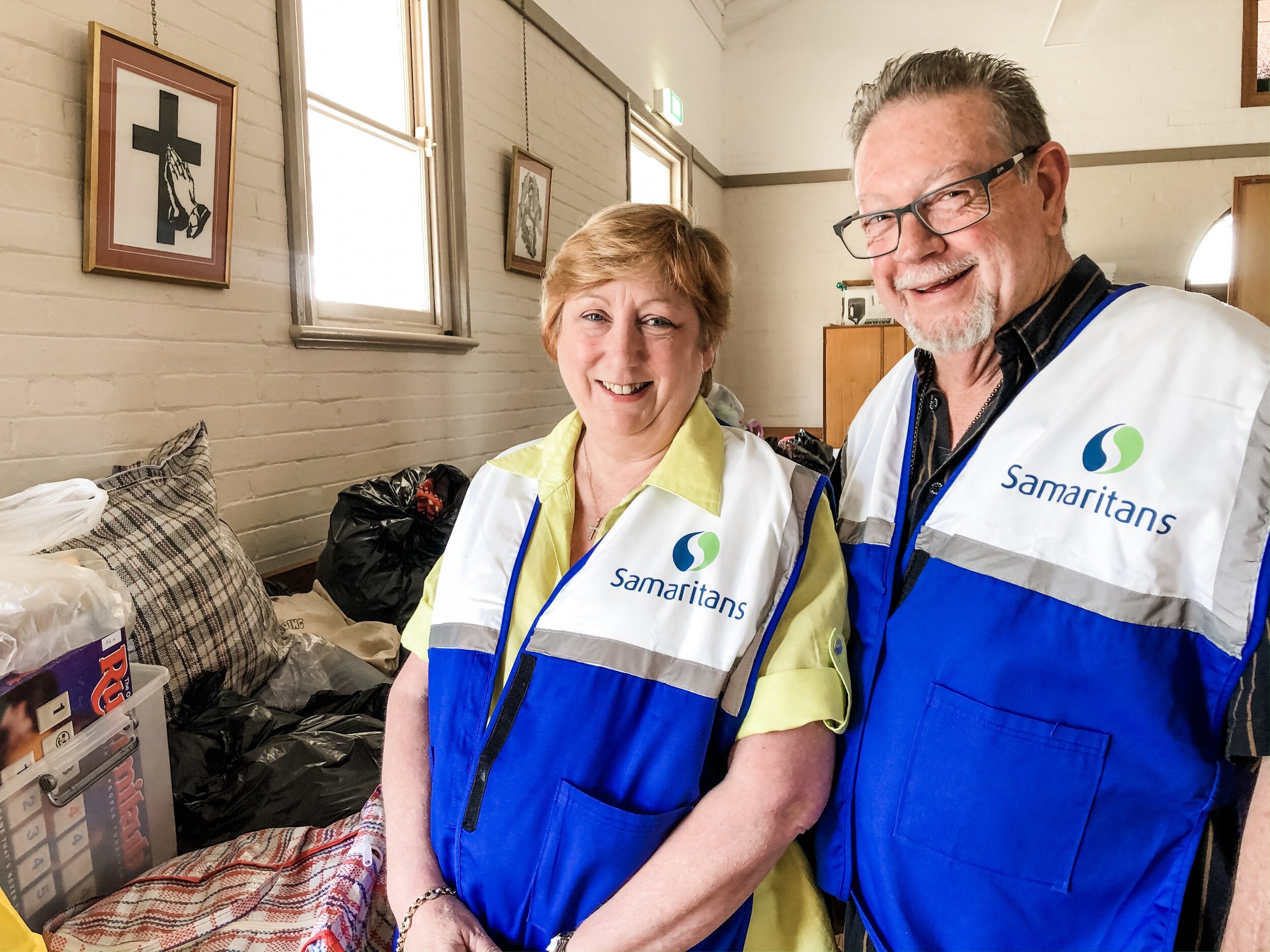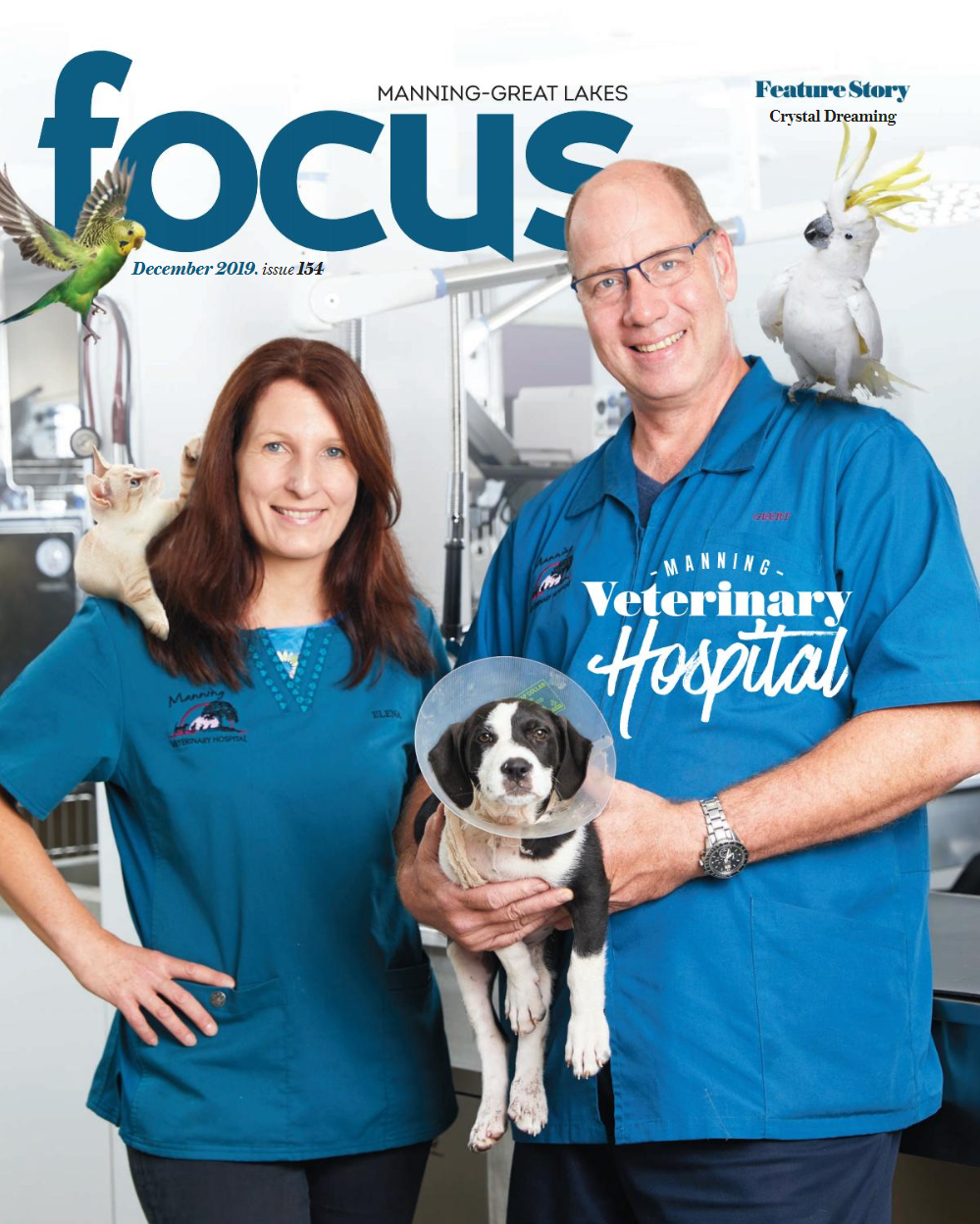A Time Of Grace
Father Peter and Fiona Tinney rallied to comfort people in the aftermath of the devastating 2009 Black Saturday bushfires in Victoria. Ten years on as bushfires on the Mid North Coast razed homes to the ground, and forced people to flee their properties, they again rallied to team with other organisations to set up Taree Evacuation Centre.
Bushfires wreaked havoc in the Manning and Great Lakes areas in November. When did you realise that you would again be on the frontline helping to meet people’s needs during a disaster?
Peter: We got the call on November 8 to see if we would be available to do disaster recovery on behalf of the Samaritans. Our job was to do material aid, which in terms of this event was beds, doonas, pillows, towels, clothing, toiletries - it’s all the stuff that people might need.
The Red Cross, Salvation Army, St John’s Ambulance, and Taree Lions Club provided other services and the centre was run by the Department of Family and Community Services.
The ferocity of the bushfires, loss of homes, scale of flora and fauna destruction, and isolating road closures shocked the community. How did people cope in the evacuation centre?
Peter: Some were still shocked and terrified. Some had to evacuate because the wind had turned and suddenly their house was under threat, and they knew they were going home to nothing.
They were quite terrified, very emotional and very fragile. The first night most people really wanted to get on with getting on. It changed a bit after that as people got tired of the fact that the roads kept closing and opening.
Fiona: They would go home and some would find they had lost their home. That for us was hard because when they’d left the centre they were hopeful and then they would come back a mess. It was like you’d patch them up, send them off and they’d come back more broken.
One of the good things about being in the centre was that everything slowed down for the people who were there – you had to stop – you couldn’t go anywhere, and there is a need to slow down because this is a journey, it’s a long haul to recovery.
Someone said to me, I don’t know how you stay so positive in amongst all of this, but I think you can’t help but be excited about how wonderful it is that everybody is here helping everybody. It is wonderful that when the going gets tough everyone comes together and works together.
“It is wonderful that when the going gets tough everyone comes together and works together.”
How has the Mid North Coast bushfires impacted the broader community?
Peter: It’s been a time of grace. In so many ways people have been kind to each other and taken the time to care for one another. It’s been really lovely.
Grace is about thankfulness, and we are really thankful to all of the people who have helped because none of us would have been able to do anything had not the whole community pitched in and done their bit. There are all sorts of appeals out there, from Lions and Rotary and the Rural Fire Service, and that’s really wonderful, but we are really, really grateful for the work that was done by so many, and the time spent with people who were vulnerable during such a terrible time.
We were overwhelmed with donations and couldn’t fit people in (the centre) because there were so many donations. It was wonderful and challenging, and really, a disaster should strengthen the community. It’s an opportunity.
Fiona: Hopefully one of the things that will come out of this terrible event is that people will have a better understanding of the need to support local emergency relief efforts.
Victims of the bushfires will now be some of the people looking for help from emergency relief … Samaritans do partner with us so they can pay for vouchers, but all emergency relief food at Taree Anglican Church is donated by parishioners and it is not coming close to keeping up with the need.
All emergency relief food at Taree Anglican Church is donated by parishioners and it is not coming close to keeping up with the need, says Father Peter Tinney. Photo | Ainslee Dennis
Chaplains were crucial to the provision of care to men, women and children at the centre. Why do you think people reach out and seek to connect with chaplains during times of crisis?
Peter: We are all kinds of frail at the best of times and tough it out and pretend we are bold and in control when we’re not. Really, we need a hand to just get through the daily stuff, and so when things get tough we really need a big hand for support … most people in our society do believe in God, they just can’t bear the church.
“I believe God entrusts us with the responsibility of caring for each other. ”
I believe God entrusts us with the responsibility of caring for each other. We do that on behalf of ourselves, and on behalf of God, and we do that in order that people might grow in understanding that God loves and cares for them.
I don’t see God so much as the controller of the weather, although I do pray for rain. I think God limits himself in how he relates to creation and so what happens in the world, happens in the world, and God’s graciousness is seen in the best of human endeavour in the service of one another.
One of the greatest opportunities for Christians is to serve the people around them in ways that show we do the job with grace, we care for people with patience, we show not just tolerance, but graciousness in the way we handle situations.
What is the next step in the bushfire recovery process?
Peter: It’s a long haul and will require volunteers and for people to be intentional. Because of the nature of disasters we will need to have some ongoing things happening in terms of practical support and also keeping an eye on people’s mental health, rebuilding resilience and a sense of confidence in their lives. We will need to continue to work together to achieve that.
Call Father Peter Tinney on 0451 677 701 to discuss how you can be involved in ongoing support projects.













